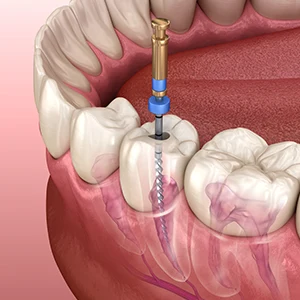Tooth pain can be anything from a minor irritation to more serious. If you’ve been experiencing persistent discomfort, it could be a sign that you need a root canal. A root canal is a proven way to save a tooth that might otherwise need extraction. Recognizing the warning signals early helps preserve your natural smile and prevents complications.
Below are the 8 key signs you need a root canal, plus helpful insights to guide your next steps.

Why Do You Need a Root Canal?
A root canal is needed when the inner tissue of your tooth, called the pulp, is infected or severely damaged. Here are the key reasons why you might need a root canal:
- Deep Decay: When cavities go untreated and penetrate the tooth, they can infect the pulp.
- Cracked or Chipped Tooth: Trauma to the tooth, such as cracking or chipping, can expose the pulp to bacteria.
- Repeated Dental Procedures: Multiple fillings or other dental work can irritate the pulp over time, leading to infection.
- Trauma or Injury: Physical injury or impact to the tooth can cause damage to the pulp and result in infection.
- Severe Tooth Pain: When the pulp becomes infected, it often causes throbbing, persistent pain, especially when chewing or applying pressure.
- Swollen or Tender Gums: A tooth infection can lead to gum swelling, tenderness, or the development of an abscess.
- Tooth Discoloration: When the pulp is damaged or infected, the tooth may turn darker, indicating a need for a root canal.
- Sensitivity to Hot or Cold: Ongoing sensitivity to temperature changes, especially if it lingers for an extended time, may indicate that the pulp is infected.
A root canal removes the infected pulp, cleans the canal, and restores the tooth, saving it from extraction and preventing further complications.
Key Signs You Need a Root Canal
When your tooth experiences significant discomfort or shows signs of infection, it could indicate the need for a root canal treatment. Here are 8 key signs you need a root canal.
1. Intense, Persistent Tooth Pain
Severe or constant tooth pain is one of the most obvious signs of infection in the dental pulp, which houses nerves and blood vessels. This pain may:
- Radiate to your jaw, ear, or face.
- It becomes worse when chewing or applying pressure to the tooth.
While discomfort from cavities or gum disease can also cause pain, pain that doesn’t subside typically indicates inflamed pulp and requires urgent care to prevent further damage.
2. Ongoing Sensitivity to Temperature
It’s normal to experience short bursts of sensitivity to hot or cold food and beverages. However, if the discomfort lasts longer than 30 seconds, it could be a sign of nerve damage or an infection inside the tooth, indicating the need for a root canal to save the tooth.
3. Tooth Discoloration or Darkening
When a tooth darkens, turning shades of gray, brown, or black, it could be a sign of pulp damage or internal bleeding. Trauma, decay, or infection can disrupt the blood flow inside the tooth, resulting in noticeable discoloration. Teeth whitening will not fix this issue until the infection is treated and the tooth undergoes root canal therapy.
4. Swelling or Tenderness in the Gums
Swelling around a particular tooth, often accompanied by pain, is a clear warning sign of an infection in the dental pulp. You might also notice:
- A pimple-like bump (abscess) on the gum that may leak pus
- Red, tender, or swollen gums
These symptoms suggest that bacteria are spreading and must be treated quickly to prevent further complications, such as an infection of the jawbone.
5. Cracked, Chipped, or Broken Tooth
A cracked or broken tooth exposes the inner pulp to bacteria, increasing the risk of infection. Whether the damage is from biting hard foods, sports injuries, or teeth grinding, even minor fractures can escalate the problem. If left untreated, a root canal may be needed to prevent infection from spreading further.
6. Extensive Tooth Decay or Large Fillings
When a cavity or old filling extends deep into the tooth, bacteria can reach the pulp chamber, causing infection. At this stage, a simple filling or crown may no longer suffice. A root canal treatment is required to remove the infected tissue and save the tooth, preserving its natural structure.
7. Sharp Pain When Chewing or Touching the Tooth
If you experience pain or sensitivity when biting or touching a particular tooth, it could mean the ligament around the root tip is inflamed due to infection. This discomfort can become severe if ignored and may lead to an abscess, bone loss, or further complications that could ultimately necessitate a root canal.
8. Swelling of the Jaw or Face
In severe cases, infection may spread beyond the tooth’s root, affecting the surrounding tissues and jawbone. This can cause visible swelling in your jaw, cheek, or neck area. Facial swelling from an untreated infection requires immediate dental attention and often requires root canal therapy to resolve the issue.
What to Expect During Root Canal Treatment
Modern root canal treatments are precise, comfortable, and highly effective, thanks to the latest advancements in dental technology and techniques. When you choose Centers for Dental Implants, you can expect a seamless, pain-free experience guided by our expert team. Here’s what the process involves:
- Numbing the Area: Local anesthesia ensures the area around your tooth is completely numb, ensuring you feel no pain during the procedure.
- Removing the Infected Pulp: The decayed or infected pulp inside the tooth is carefully removed to eliminate pain and prevent further infection.
- Cleaning and Shaping the Canal: The tooth’s interior is thoroughly cleaned and shaped to prepare it for the filling material.
- Sealing and Restoring the Tooth: Once the canal is cleaned, it’s sealed with a biocompatible material. A durable crown is then placed to restore the tooth’s function and appearance.
Many patients find the procedure comparable to a standard filling, with minimal discomfort and a quick recovery time. Root canal therapy can save your tooth, relieve pain, and restore your smile to full health.
Preventing the Need for a Root Canal
While not all cases of tooth infection can be avoided, there are several proactive steps you can take to reduce the risk and maintain optimal oral health:
- Practice Consistent Oral Hygiene: Brush your teeth at least twice a day and floss daily to remove plaque and food particles, preventing decay and gum disease from reaching the pulp.
- Visit Your Dentist Regularly: Schedule routine dental checkups every six months. Regular exams and cleanings help catch early signs of decay or damage before they require more intensive treatments like a root canal.
- Address Cavities Early: Don’t delay treatment if you notice a cavity or suspect decay. Early intervention can prevent the infection from reaching the pulp, potentially requiring a root canal.
- Wear a Mouthguard: If you play contact sports or suffer from bruxism (teeth grinding), wearing a mouthguard protects your teeth from fractures and excessive wear that can expose the pulp to infection.
- Maintain a Healthy Diet: A balanced diet rich in calcium and vitamin D can strengthen your teeth and reduce the risk of decay. Limiting sugary snacks and drinks will also help protect your tooth enamel.
By following these practices, you can significantly reduce the chances of needing a root canal and ensure the long-term health of your teeth.
Conclusion
A root canal is an effective solution to save your natural tooth and maintain your overall oral health. It can successfully treat an infected tooth by removing the damaged pulp and preventing the infection from spreading. Signs such as persistent pain, prolonged sensitivity, gum swelling, or discoloration should not be ignored. Early detection and prompt treatment are crucial to prevent further damage, ensuring a smoother, quicker recovery. By addressing these issues early on, you can avoid more extensive procedures and preserve your smile for years. If you experience these symptoms, don’t wait; consult your dentist to determine if a root canal is the right solution for you.
Schedule Your Root Canal Consultation Today
Don’t wait until discomfort becomes unbearable. Centers for Dental Implants provides gentle, modern root canal therapy to relieve pain and save your tooth.
Book a consultation today or visit us at a convenient location and restore your smile with confidence.
FAQs
Is a root canal painful?
Contrary to popular belief, root canals are not painful. With modern techniques and anesthesia, the procedure is no more uncomfortable than getting a regular filling. Many patients report feeling little to no pain during the process.
Are Root Canals Safe During Pregnancy?
Yes, root canals are safe during pregnancy. Inform your dentist about your pregnancy so they can take necessary precautions, such as avoiding X-rays and using pregnancy-safe medications. It’s best to schedule the procedure during the second trimester. Always consult your dentist and obstetrician beforehand.
What are the signs you need a root canal after a filling?
After a filling, signs you may need a root canal include:
- Persistent tooth pain or throbbing
- Lingering sensitivity to hot or cold
- Tooth discoloration or darkening
- Pain when chewing or biting
- Swelling or tenderness in the gums around the tooth
If you notice these symptoms, consult your dentist for further evaluation.
How long does a root canal take?
A root canal procedure takes 60 to 90 minutes, depending on the complexity of the case. More complex cases, such as those involving multiple canals, may require additional time or a follow-up visit.
What happens after a root canal?
After a root canal, you may experience mild discomfort or sensitivity in the treated area for a few days. This is completely normal and can be managed with over-the-counter pain relievers. Your dentist will place a crown or filling to restore the tooth’s function and appearance.
Can a root canal fail?
While rare, a root canal can fail if the infection reoccurs due to complications like insufficient canal cleaning or a tooth crack. In such cases, retreatment or further procedures may be necessary. However, root canal procedures are highly successful with proper care and timely treatment.
Can a root canal cause ear pain?
Ear pain can sometimes occur due to referred pain from an infected tooth. Since tooth nerves are linked to facial and jaw nerves, pain may radiate to the ear. However, the root canal itself does not directly cause ear pain.
What are the first signs of needing a root canal?
Early signs include persistent tooth pain, lingering sensitivity to hot or cold, tooth discoloration, and swollen gums. If you experience these symptoms, seeing a dentist for evaluation is important.

